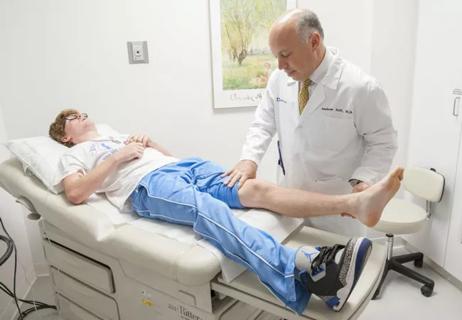Significant advances had a direct impact on clinical practice

Advertisement
Cleveland Clinic is a non-profit academic medical center. Advertising on our site helps support our mission. We do not endorse non-Cleveland Clinic products or services. Policy
This year I was honored to be invited to provide the “Clinical Science Year in Review” at the American College of Rheumatology (ACR) Convergence 2022 meeting. Now that this lecture has come and gone, I have had an opportunity to reflect on what I learned. In addition to knowledge gained from the amazing works of published science, what I found took me back to why I chose to become a rheumatologist.
The past year brought forth significant advancements in rheumatology that had a direct impact on clinical practice or represented innovative approaches warranting further investigation. During this time, the Food and Drug Administration (FDA) approved six new indications impacting management of the spondyloarthritis family of diseases. In systemic lupus erythematosus, investigations included the first study of chimeric antigen receptor (CAR) T cells as well as phase 2 clinical trials of novel agents that target type I interferon pathways and B cells. Based on the results from a randomized trial of intravenous immunoglobulin on dermatomyositis, we also saw the first FDA-approved treatment for an inflammatory myositis. This body of work, as well as many other important contributions, demonstrate how progress in rheumatology continues to grow at a rapid pace.
As treatment options expand throughout the rheumatic diseases, weighing risk and benefit has become increasingly important. The assessment of risk needs to include not only short- and long-term toxicities related to the pharmacologic agent but also the risk of inadequately treated disease. During the past year, critical studies in rheumatoid arthritis examined the benefit/harm of glucocorticoids and the safety of a Janus kinase inhibitor. These studies reflect the commitment that rheumatology investigators and practitioners have made in seeking information that will inform shared decision-making with their patients.
Advertisement
An increased understanding of the pathophysiologic mechanisms of disease was fundamental to many of this year’s clinical trials in generating hypotheses for both efficacy and safety. While the opportunity for advancements through basic, translational and clinical research has never been greater, our ability to conduct such science has become increasingly difficult. The studies presented in the “Year in Review” exemplify how research funding as well support for junior and senior investigators is critical for future innovations in rheumatology.
An increased understanding of the pathophysiologic mechanisms of disease was fundamental to many of this year’s clinical trials in generating hypotheses for both efficacy and safety. While the opportunity for advancements through basic, translational and clinical research has never been greater, our ability to conduct such science has become increasingly difficult. The studies presented in the “Year in Review” exemplify how research funding as well support for junior and senior investigators is critical for future innovations in rheumatology.
Throughout the COVID pandemic, rheumatology professionals have played an essential role in providing both care and updated knowledge to their patients. The past year brought constant changes to which the rheumatology community responded. From vaccines to variants to novel pre-exposure prophylactic measures, it was the rheumatologist who our immunosuppressed patients turned to with their questions and concerns.
Advertisement
Practicing rheumatologists applying information gained from the Global Rheumatology Alliance, the ACR COVID task force, and other international networks exemplified how our collective mission to keep patients safe can be accomplished by working together.
When first began to consider the “Year in Review,” it became clear that being able to select and present topics required not only an understanding of the individual publications but also the background behind each study. I sought to understand from others what they found important and meaningful during the past year and they in turn became my teachers.
I reached out to a broad spectrum of people: investigators in academic settings, rheumatologists in practice, trainees, and rheumatology health professionals. The response I received was staggering – all busy people, all wanting to help and to share their thoughts. It was only through their guidance that the “Year in Review” was possible.
When I chose to specialize in rheumatology, three key points motivated my decision: the rapid growth of scientific knowledge in the field, the ability to play an impactful role in the lives of patients, and the rheumatology community. What the “Year in Review” affirmed to me is that these elements are not only thriving today but will remain fundamental in propelling rheumatology into its exciting future.
Advertisement
Advertisement

New clinic meets Hispanic patients where they are

Fellows will train under faculty with broad range of expertise

Collaboration was key to identifying source of nerve condition

When to suspect concurrent giant cell arteritis

New research explores the role of immune cell and blood-brain barrier changes

Adam Brown, MD, shares his passion for solving rheumatologic mysteries

Unraveling the TNFA receptor 2/dendritic cell axis

Nasal bridge inflammation, ear swelling and neck stiffness narrow the differential diagnosis